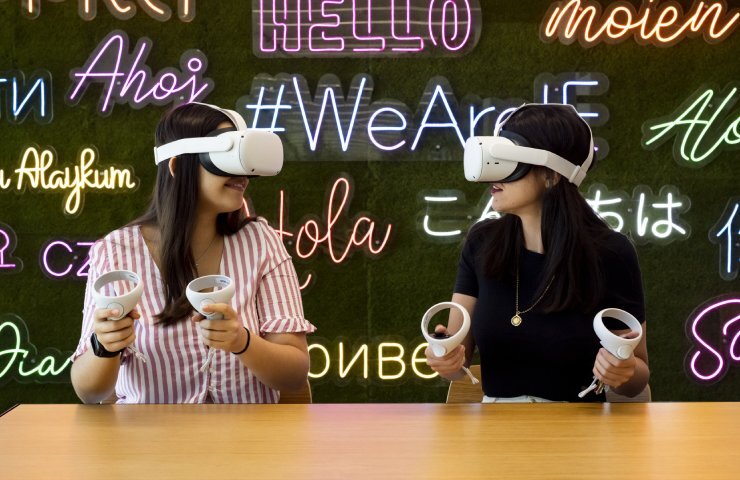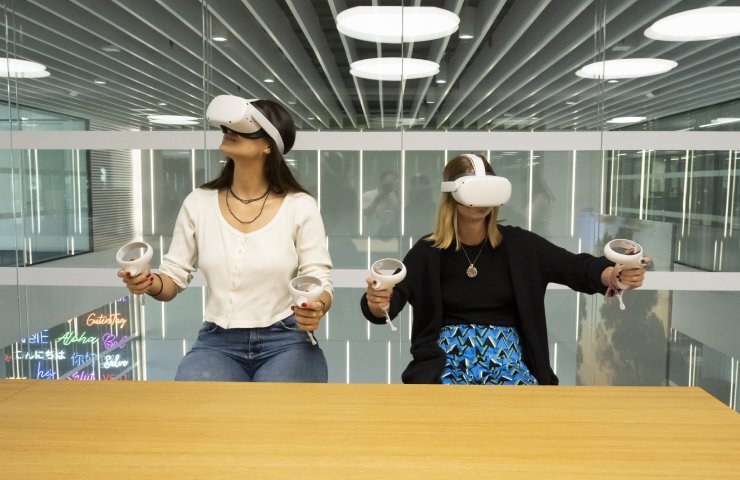The immersive technologies that have given rise to the metaverse may be more familiar to those new to the field. With special equipment, including glasses and handheld controllers, users can superimpose virtual elements onto their vision of reality (AR) or experience a fully immersive 3D environment (VR). The metaverse takes this a step further.
The metaverse is a computer-generated virtual reality space where users can interact with other users. It is a combination of VR (virtual reality) and AR (augmented reality) that enables users to interact in virtual and real environments with digital elements. —Alejandro Ameneiro, Director of Innovation
Director of Innovation at IE University, Alejandro Ameneiro, runs us through how these immersive technologies have transported the academic world to new realms and how IE University is making the most of this new technology.
Who will create these immersive—and innovative—virtual worlds?
New technology means new jobs, and virtual worlds require talented professionals from both technical and creative fields. Some of these jobs include XR video developers, Unity developers, Unreal artists, XR storytellers, VR hardware engineers, metaverse marketing specialists, actors and voice actors, audio specialists, 3D designers, editors and data analysis experts.
New technologies focused on the metaverse put tools in the hands of creatives that, until recently, were only imagined and conceptualized in science fiction films.

Metaverse production draws similarities with that of the film and gaming industries, providing many roles for those interested in metaverse development.
What does the metaverse mean for the future of work?
As well as creating new professions, the metaverse has the power to change the way we work.
We will be able to analyze data in 3D versus the traditional 2D reports and graphs and discuss them in real-time with people around the world. We can see online collaboration platforms in 2D and 3D for all sorts of creative and business activities, such as Launch Pad’s Gravity VR.
With so much innovation in the workplace, it’s increasingly important to update the way we train students. Beyond autonomous access to the internet and research, we must offer relevant content and tools, starting in childhood, for students to be able to take on these new and upcoming jobs.
Where can these “world creators” be trained?
In the age of independent online learning, the internet has given unbridled access to education. Discovering content creation has never been easier, through platforms such as YouTube and Coursera, or on the websites of software manufacturers like Unity or Unreal.
However, a university dedicated to an innovative education experience is always a great place to learn these types of skills. It is best to pursue education at universities whose pedagogical methodology and academic programs are embracing the latest trends in the field of the metaverse and immersive experiences.
In 2022, the IE School of Science and Technology launched its Metaverse and Gaming Experience Specialization, providing training in VR, AR and the metaverse, web3, blockchain, NFTs, artificial intelligence and more. This will be available to the IE University community in Spring 2023.
Teachers will have the best tools for students to use for practice, simulations and much more. This way, IE University prepares students for new professions and entrepreneurial ventures.
How are AR and VR being used to transform education?
The field of education is being transported to new worlds—and this isn’t just a fantasy. IE University is committed to implementing AR and VR technology, from VR glasses to collaborative spaces and IE Immersive Experiences. Prospective students can even tour the Segovia campus or IE Tower using VR glasses, which will soon be available on the Oculus.com marketplace.

AR and VR have the ability to enhance cognitive experiences, increasing the effectiveness and appeal of learning.
Above all, the advantage lies in enabling students to explore their environment in a different way and enjoy an interactive and enriching learning process.
IE University works with partners like Meta to develop Immersive XR Labs, using next-generation Meta Quest 2 VR/AR glasses, training experts including Bodyswaps and Virtualspeech, and immersion software companies like Unity.
The most popular so far is technical training—training in sensitive processes and AR-assisted testing of installations. With VR, virtual classrooms are combined with real classrooms, offering a truly blended, liquid and immersive experience.
In terms of academic use overall, we are at the very beginning of the Big Bang of immersive technologies—the possibilities are infinite and unknown. —Alejandro Ameneiro, Director of Innovation
What’s more, IE University is home to the Metaverse Center, created in partnership with Elysium Ventures, which is the first global research and innovation center on the metaverse. With the continued development of AR, VR and the metaverse, it is an exciting time to be a student, and IE University will continue to be at the forefront of innovation.
Interested in learning more about innovative education?
IE University’s learning methodology unites education and immersive technologies to elevate the learning experience.






